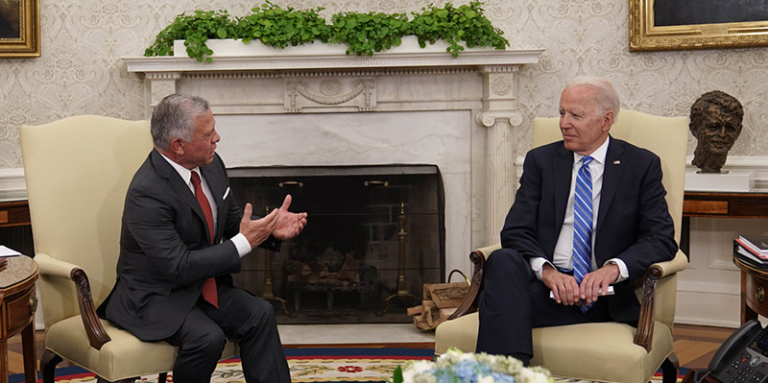
On July 19, 2021, King Abdullah II of Jordan became the first Arab leader to visit President Joe Biden at the White House. The symbolism alone was significant, but the two leaders had substantive gains in mind as well.
During the previous four years of American Middle East policy, especially regarding Arab allies, the Trump Administration had pivoted toward a deep reliance on Saudi Arabia and the United Arab Emirates, and away from other traditional allies like Jordan. Trump and his key Middle East representative, his son-in-law Jared Kushner, had continued the long-standing US ties to Israel but in a way that marginalized both Palestinians and the Hashemite Kingdom. With Kushner the de facto face of Trump’s Middle East policy, initiatives seemed to emerge via personalized text messaging between Kushner, then-Israeli Prime Minister Benjamin Netanyahu, Saudi Arabia’s Crown Prince Mohammed bin Salman, and Crown Prince Mohammed bin Zayed of Abu Dhabi, UAE. For Jordan, the Trump years represented an Israel- and Gulf-centric approach to policy, marked with concern over Iran and its ambitions but with little time or interest left for the Palestinian people or for Jordan.
While the United States has never really been regarded as even-handed in its approach to the Israeli-Palestinian conflict, Jordanian officials—and Jordanian kings—were used to having an outsized role and influence with their US ally. The Trump years were therefore disturbing and unfamiliar territory during which the White House ran counter to key Jordanian policy preferences—such as when the United States recognized Jerusalem as Israel’s capital, moved the US embassy to Jerusalem, defunded the United Nations Relief and Works Agency for Palestine Refugees (UNRWA), and pursued the failed attempt at a peace deal—all over Jordanian objections. Each measure seemed to underscore anew Jordan’s declining influence with the United States, but also its relative marginalization in the face of an emergent Israeli-Saudi-Emirati axis in regional politics.
King Abdullah’s Washington visit offered the chance for a mutual reset, one embraced by both the monarch and the new American president.
Jordanian policy-makers resented the sidelining of Jordan and hoped to reset US-Jordan relations at the earliest possible opportunity. That opportunity has now arrived. King Abdullah’s Washington visit offered the chance for a mutual reset, one embraced by both the monarch and the new American president. Even the mere symbolism of being the first leader of an Arab country invited to Washington was important: Jordan and not Saudi Arabia, or the UAE, or even Egypt. But once that symbolism was made clear by the visit itself and its various photo and video opportunities, the rest was serious business, as the two sides had much of substance to discuss.
Strategic Partnership
As expected, King Abdullah’s White House visit was warm and cordial, since he and President Biden have known each other for decades. Both leaders emphasized the importance of a close American-Jordanian relationship and warmly expressed mutual admiration and support. In the Oval Office meeting, Biden and the king spoke of a strong partnership, with the former adding “You’ve always been there and we will always be there for Jordan.”
They also had specific issues in mind. For the United States, Jordan remains a key strategic partner with extensive political, economic, military, and intelligence cooperation. In addition to his Washington, DC meetings, for example, the king also visited US Central Command (CENTCOM) in Tampa, Florida. In his session with the king, CENTCOM Commander General Frank McKenzie described Jordan as “an important pillar in preserving peace and advancing security throughout the region.”
Jordan and the United States signed a new defense cooperation agreement in January 2021. While the agreement deepened military cooperation between the two states, it was also met with extensive domestic criticism, especially regarding Jordan’s independence and sovereignty. The two countries have long pursued military efforts together, however, and Jordan is even officially designated as a Major non-NATO Ally not only to the United States but also to the entire western alliance. By July, the United States had closed key bases and supply depots in Qatar, shifting some of its basing, personnel, and supplies to Jordan instead.
Like many other Arab states, Jordan is no longer supportive of an embargo of Assad’s Syria, viewing the Syrian dictator as the de facto winner of the longtime civil war.
This suggests that Jordan will now play an enhanced role in the American strategy to counter Iran—not in a direct military sense, but at least as host to some US forces—while it already serves as a forward staging area for the coalition against the Islamic State. Although the Jordanian general public views much of this in a negative light, the state welcomes further military and strategic cooperation. The Jordanian government also hopes to gain exemptions from the United States for the Caesar Act, which restricts trade to Syria. Like many other Arab states, Jordan is no longer supportive of an embargo of Assad’s Syria, viewing the Syrian dictator as the de facto winner of the longtime civil war. Amman is specifically interested in increasing Jordanian-Syrian trade for both its economic and practical effects, including normalizing and securing its northern border.
The United States, Jordan, and Israel
The United States is also interested in securing a better bilateral relationship between Israel and Jordan. That, too, had suffered in the Trump and Netanyahu years; but now with both leaders ousted from power, Washington also sees an opportunity for the relationship to be reset. Israel’s new prime minister, Naftali Bennett, has allegedly already had a secret meeting with King Abdullah in Amman, in a bid to improve ties. Foreign Minister Yair Lapid and his Jordanian counterpart, Ayman al-Safadi, also met at the Allenby Bridge border crossing for discussions that resulted in an Israeli pledge to boost water supplies to the kingdom. The agreement also allowed for increased trade between Jordan and the West Bank.
While Jordanians welcome the end of the Netanyahu government in Israel, they are under no illusions about its successor. Lapid is seen as essentially a centrist, but Bennett has long occupied a spot in the far-right of the Israeli political spectrum and this runs counter to a Jordanian state anxious to push for Palestinian rights, and one that is still committed to a two-state solution to the Israeli-Palestinian conflict. The king, of course, restated Jordan’s positions on these matters to the American president. So while the expectation of an Israeli-Jordanian rapprochement is reasonable, and something that Biden very much wants to secure, it does not translate yet to a revived Middle East peace process—nor to improvement in the daily lives of Palestinians or the realization of their aspirations for independence and statehood.
The Jordanians have been amenable to US interests in a better relationship between Israel and Jordan, but they have also conveyed to their counterparts at almost every level that this is not enough.
The Jordanians have been amenable to US interests in a better relationship between Israel and Jordan, but they have also conveyed to their counterparts at almost every level that this is not enough, especially that the Palestinian issue remains the central question to be solved and one that would require dramatic changes in Israeli policy. In addition, the Jordanian side is certainly intent on restoring Jordan’s regional role and its alliance with the United States to its fullest extent, but it is also keen to get external commitments for its historic role in Jerusalem as protector of the Muslim and Christian holy places, and especially the Hashemite guardianship role over the Al-Aqsa Mosque. This role, many Jordanians believed, would have been undercut by the various Trump/Kushner plans. But as veteran Jordanian journalist Rana Sabbagh noted,1 many Jordanians felt that the king came to Washington bearing the coffin for what Trump had touted as the “Deal of the Century.”
Regional and Domestic Challenges
Jordan has also pushed for the formation of a regional alliance of Arab states that, like the kingdom, are American allies. Jordan, Iraq, and Egypt have now held four summits attempting to deepen intra-regional cooperation in ways that they believe the United States will support, since together they all oppose Iranian involvement in the domestic politics of other states, and especially in Iraq. But the bloc is also pursuing extensive cooperation on energy: on electricity grids, natural gas, and an oil pipeline from Iraq’s Basra to Jordan’s Aqaba. So, while the king’s visit was meant to represent Jordanian interests and concerns, it also represented the views and concerns of its specific allied Arab governments, including Egypt, Iraq, and to some, even the Palestinian Authority.
The United States also contributed 500,000 new vaccines to Jordan to combat the COVID-19 virus, which has hit the country hard. This crisis, however, was but the latest disaster to befall the kingdom, as Jordan was already reeling economically and dealing with the influx of hundreds of thousands of Syrian refugees. The Jordanian unemployment rate stands at a staggering 25 percent, and youth unemployment is far worse: at fully 50 percent. Jordan is also struggling under a mountain of debt that is about equal to its national income. And yet the economic and public health struggles do not end the list, as Jordanians complain about declining freedoms of speech, assembly, and participation in public life.
Amid all of these challenges, Jordan also struggled through its own royal rift in April 2021, with the state announcing a plot of sedition against the kingdom. This centered around former Crown Prince Hamzah bin Hussein, who has a significant popular following. No charges have been made against the prince himself, who was placed under house arrest or royal protection but who in any case temporarily disappeared from public view. Other accused figures, however, were tried and convicted of sedition and sentenced to 15 years of hard labor, including the king’s former advisor Bassem Awadallah. The US government tends to view Jordan through a strategic lens and hence remains deeply concerned about the kingdom’s stability and security. Most Jordanians, however, are more concerned with day-to-day urgent matters like unemployment, the high cost of living in terms of food, fuel, and housing, and basic personal rights.
Most Jordanians are more concerned with day-to-day urgent matters like unemployment, the high cost of living in terms of food, fuel, and housing, and basic personal rights.
Some activists hope that the reset US-Jordanian relationship will also include pressure for more genuine and not simply cosmetic reform. Prior to the White House summit, the king had announced a new 92-member royal commission charged with reforming and “modernizing” Jordanian politics. Members are drawn from various sectors of the elite and led by former Prime Minister Samir al-Rifa’i who, perhaps ironically, was ousted in the 2011 Arab Spring protests. This is the fourth major attempt at reform since the 1989 liberalization process. Therefore, while some hope for meaningful change, others fear that this represents a déjà vu. The question, therefore, is whether this round will represent more movement than progress, or if it will move beyond the cosmetic to significant and meaningful political reform.
Regardless of how the latest reform effort works out, following the White House meetings, Jordan does at least seem to have secured much of the external validation it was seeking. The White House statement regarding the meeting noted that “the President expressed his strong support for a two-state solution to the Israeli-Palestinian conflict and respect for Jordan’s special role as custodian of Muslim holy places in Jerusalem.” The statement further applauded the Israeli-Jordanian agreement to increase water supplies to Jordan and noted that Biden even “commended the important role Jordan plays in the wider stability of the region and welcomed the recent trilateral summit in Baghdad between Iraq, Jordan, and Egypt.” While the bilateral reset certainly seems to have succeeded, many Jordanians will still be focused on pressing domestic matters. To that end, the Hashemite regime hopes for further aid, investment, and other economic support to help alleviate pressures on that front, too.
1 Source is in Arabic.

